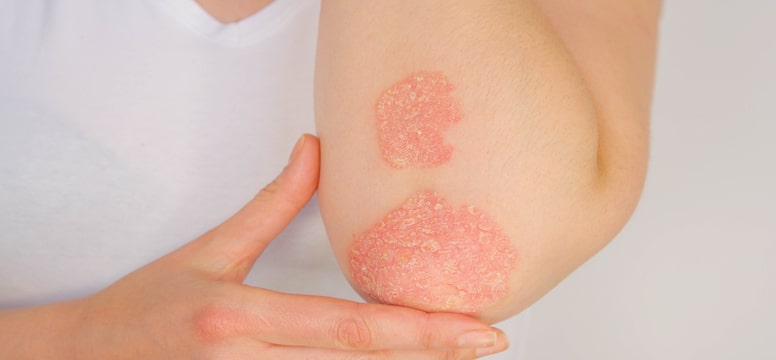
More than 7 million American adults are living with psoriasis. As a chronic condition, psoriasis requires prompt, accurate, and ongoing care from an experienced physician. At Rendon Center in Boca Raton, our team of dermatologists provides comprehensive care based on each patient's needs.
What is psoriasis?
Psoriasis is a chronic skin condition caused by systemic inflammation resulting from an overactive immune system. It is characterized by raised plaques on small or large areas of the body. These plaques, which may look like scales on the skin, occur because the overactive immune system accelerates cellular production. In a healthy system, the skin cells grow and shed over the course of one month. In a person with psoriasis, new skin cells grow in a matter of three to four days. Rather than shed, the old cells build up on the epidermis. Symptoms often start between ages 15 and 25 but may occur at any age. There are five types of psoriasis. A person may have more than one type at a time and may have different types on different parts of the body.
What are the trigger factors for psoriasis?
While the cause of psoriasis isn't fully known, scientists have determined that genetics and the immune system are involved. Studies have proven that psoriasis is not contagious. Its symptoms are triggered by one or more stimulants. These may be:
- Stress
- Skin injury
- Illness
- Weather
- Foods
- Alcohol
- Allergies
- Environmental factors
When living with psoriasis, it can be helpful to track your symptoms, as well as potential triggers.
What treatment options are available for psoriasis?
The goal in psoriasis treatment is to stop the rapid growth of skin cells and to help the body release the buildup of plaques on the skin. Dermatologists develop treatment around each patient's unique situation and may recommend one or more modalities to achieve optimal results. The general categories of treatment options for psoriasis include topical therapy using creams or ointments, phototherapy (light), and oral or injected medication.
What are the different types of psoriasis?
The following is a partial list of the various types of psoriasis. The Rendon Center doctor will identify the type you suffer from and develop a treatment plan.
Psoriasis Vulgaris
This is the most common form, affecting 80 percent of people diagnosed with psoriasis. It can be identified by the thick patches of skin that are red or sometimes pink in color. The patches of skin are topped by a white scaly buildup of dead skin cells. Commonly called plaque psoriasis, this form can develop anywhere on the body.
Guttate Psoriasis
Most commonly identified by small scaly red spots on the skin that are teardrop shaped. They are most common on the arms, midsection, and legs. This can be indicative of an underlying infection.
Inverse Psoriasis
This appears in skin folds such as the armpits and is smooth, red patches of skin. This form does not have the scales that others do and is most common in people who are obese.
Pustular Psoriasis
Identifiable by pus-filled blisters. The first symptom is bright red skin followed by an outbreak of blisters. They are most commonly found on the palms of the hands and soles of the feet.
Can the sun help?
Some studies suggest that brief, daily exposure to natural sunlight may help improve the symptoms of psoriasis. It usually is not enough on its own and should not be viewed as a primary psoriasis treatment. Before beginning a regimen of sunlight to manage psoriasis, it is important to talk to your dermatologist about the safest way to do so without significantly increasing the risk of skin cancer and premature aging.
Are any other conditions linked to psoriasis?
The systemic inflammation that drives symptoms of psoriatic disease can increase the risk for other conditions, such as:
- Cardiovascular disease
- Metabolic syndrome
- Obesity
- Insulin resistance
- High cholesterol
- High blood pressure
- Nonalcoholic fatty liver disease
- Depression and anxiety
- Inflammatory bowel disease
- Malignancy
- Chronic kidney disease
- Sleep apnea
- Chronic obstructive pulmonary disease
- Uveitis
What's the difference between psoriasis and eczema?
Psoriasis & Eczema Feel Different
People with eczema often feel an intense itch and urge to scratch. While psoriasis can be itchy, people with this condition also often report sensations like burning or stinging.
Psoriasis and Eczema Look Different
An eczema flare-up makes the skin appear inflamed, swollen, and red. Tiny bumps or welts may form and the skin may crust or ooze. Some patches of skin may look dark and leathery. The primary difference with psoriasis is that the skin looks scaly from the plaques that form. Psoriatic skin looks thicker on closer observation, as well.
We often see psoriasis in areas like the:
- Elbows
- Knees
- Palms of the hands
- Soles of the feet
- Scalp
- Face
- Lower back
Patches may also develop on the lips, eyelids, fingernails, toenails, ears, and skin folds.
Eczema patches may form on the scalp, cheeks, chin, inner elbows, back of the knees, neck, wrists, or ankles.
Schedule Your Consultation Today!
Rendon Center can address the signs and symptoms of psoriasis and many other conditions. Our combination of innovative technology and experience translates to superior, quality care. To schedule your visit with one of our dermatologists, contact us at 561-750-0544.

